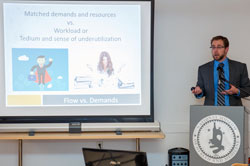Mental skills training yields clarity for today's Warfighter
By: Paul Bello, National Museum of Health and Medicine
SILVER SPRING, Md. – Success and safety of the nation hinge upon the well-being of today's Warfighters. Dr. Tim Herzog, Sport Psychology Education Specialist with the Uniformed Services University of the Health Sciences' (USUHS) Human Performance Resource Center (HPRC) offered insight into a service member's human performance optimization during the Medical Museum Science Café November 18 at the Silver Spring Civic Building.
Entitled "Mental Skills for Energy Management," the discussion was hosted by the National Museum of Health and Medicine (NMHM) and concludes a year-long series of informal discussions dedicated to evolving health, science and medical technologies.
Herzog stated that mental skills training and performance/sport psychology are integral to the health and well-being of American service members. Some areas of HPRC focus include physical fitness, nutrition, family and relationships. As with any profession, Herzog noted there are demands associated with these areas. From a military perspective, he said they can stem from such things as deployments, job performance and personal finances.
Performance in a military context is vastly different from that of a sports context, where the stakes aren't as high. According to Herzog, there is a much more serious set of threats facing those charged with defending a nation as opposed to those tasked with athletic challenges like hitting a baseball or throwing a football. Though, sport psychology principles for dealing with pressure still come into play.
"When thinking about the demand resource model, the concepts the military has arrived at mesh quite well with sport psychology," he said. "Experiencing flow, or being ‘in the zone' as the media calls it, is a psychological state associated with people's best performance. Part of flow is that you are completely immersed in what you're doing, so you can set the stage for flow but you cannot force flow."
By letting their training take over and not focusing on self-evaluation until later, the actions of Warfighters will lead more often to positive results. When personal demands become a dominant factor, Herzog said these demands may make flow less likely and impede a Warfighter's performance. Part of flow is feeling in control and prepared. Mental skills are a sport/performance psychology resource that can help in feeling prepared to meet big demands, Herzog said.
The role of sport/performance psychology within the military has evolved over the last 25 years, as Herzog explained. The U.S. Military Academy at West Point started their Center for Enhanced Performance (CEP) in 1989. Since that time, he said the program has trained cadets in the use of mental skills for performance in sports, combat, and life. In 2006, the U.S. Army's Center for Enhanced Performance Program, which was based on the CEP at West Point, was introduced to installations around the country.
In 2007, the work of Martin Seligman (the "father of positive psychology") was integrated with another Army program called Battlemind to form the Comprehensive Soldier Fitness Program. This aimed at improving resilience before battle as a means of improving subsequent transitions to life back home. That program has since been expanded to include soldiers, families and Army civilians, Herzog said. He also spoke of a customizable performance enhancement training program that was also first developed in 2007, called "One Shot One Kill," which has a curriculum available on HPRC's website.
"Mental skills training can affect the mind-body interaction and lead to better performance," Herzog said. "Self-talk, the things you say to yourself inside your head, is a skill that can be developed largely through awareness of your habits. Mental imagery, where you can develop physical skills by practicing them in your head, is also useful."
Herzog said it's also important to focus on communication and that empathy can help Warfighters accept difficult emotions to regain focus on the task at hand. For more information on USUHS's Human Performance Resource Center, visit www.hprc-online.org.
NMHM's Medical Museum Science Cafés are a regular series of informal talks that connect the mission of the Department of Defense museum with the public. NMHM was founded as the Army Medical Museum in 1862 and moved to its new location in Silver Spring, Md. in 2012. The next Science Café is entitled "Bacteriophage Therapy: Is There an Alternative to Antibiotics?" It will be held Tuesday, Aug. 26 from 6-7 p.m. at the Silver Spring Civic Building. The program is free and open to the public.
 |
Caption: Dr. Tim Herzog, Sport Psychology Education Specialist for the Human Performance Resource Center (HPRC), Uniformed Services University of the Health Sciences, speaks about mindfulness-based approaches to human performance optimization during the November 2014 Medical Museum Science Café hosted by the National Museum of Health and Medicine. HPRC is a Department of Defense initiative under the Force Health Protection and Readiness Program. The science café was held Nov. 18, 2014, at the Silver Spring Civic Building in Silver Spring, Maryland. |



